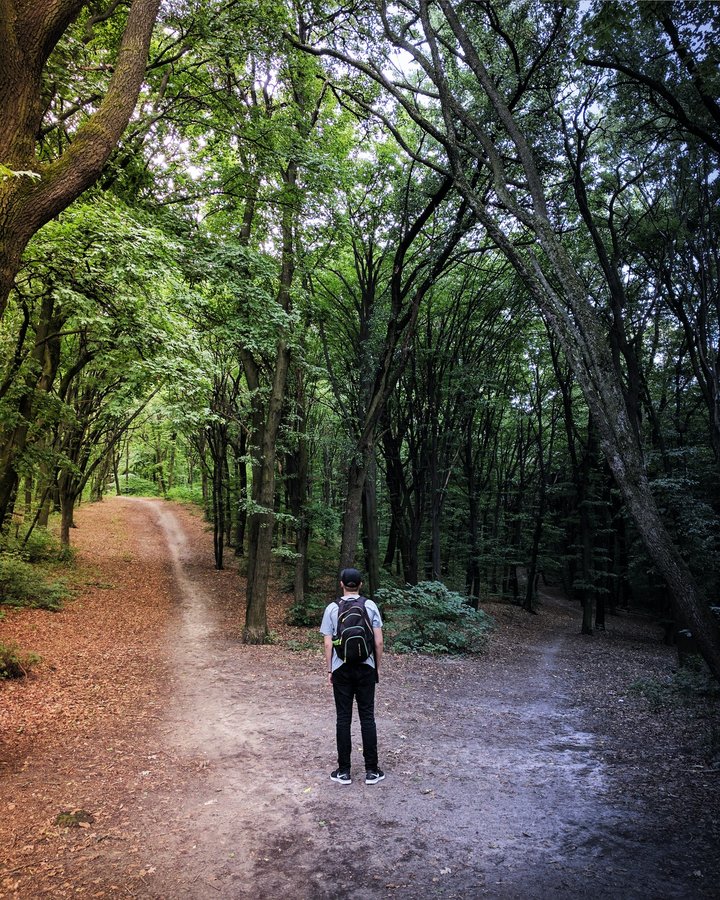And you may find yourself living in a shotgun
shack
And you may find yourself in another part of
the world
And you may find yourself behind the wheel of a
large automobile
And you may find yourself in a beautiful house,
with a beautiful wife
And you may ask yourself, “Well…how did I
get here?”
Good question, how did I get here? How did you? Once in a Lifetime, the 1980 Talking Heads track written by David Byrne and Brian Eno, sums up, in glorious Afrobeat, the question I suppose all of us ask ourselves, usually lying awake at night: Of all the lives we could have lived, why is this is the one that we actually are living? Take a moment to consider all those forks in the road, the decision points, the happenstances, when your life could’ve gone in some other direction.
For me, most of my Big Choices didn’t seem like choices at the time. I became a civil engineer, not because I wanted to and thought that would be a cool profession, but because at school (England, 1950s) I was better at math and physics than art or languages. It wasn’t like dozens of options were laid out in front of me, each with its pros and cons. Rather, if you inclined towards science (as opposed to humanities), you were told: Engineering!
These days, in this country, the choices are broader and, in my mind, more interesting. But—here’s the thing—the choices young people face (wittingly or not) narrow down as they grow older, despite gaining more knowledge and more experience. “In the beginner’s mind there are many possibilities, but in the expert’s there are few,” according to the zen priest Suzuki Roshi. When I was a child, anything seemed possible (even if it wasn’t!). Now, seven decades later, options are more limited with every year that goes by.

Photo: Vladislav Babienko. Unsplash license.
Some of the other big choices in my life really do seem clear options, like that Frost poem: “Two roads diverged in a yellow wood…I took the one less traveled by, And that has made all the difference.” OK, less traveled, that sounds like a pretty good criterion when faced with an either-or choice. Or how about, riskier? Going back to the ancient Greeks (who really got the bittersweet essence of YOLO), Homer staked out the dichotomy of Achilles’ future: a boring long life or a glorious short one. Achilles being Achilles (half-human, half-god—his mom was a sea nymph) chose to go out in a blaze of glory, of course. (Which would you have gone for?) Similarly in John Fowles’ novel The Magus, the protagonist is challenged: Utram bibis? Aquam an undam? (Which do you drink? The water or the wave?) (Shiver!)
All these thoughts bubbled to the surface re-reading an essay by Joshua Rothman in The New Yorker (12/21/20), in which he mused that, “Part of the work of being a modern person seems to be dreaming of alternate lives in which you don’t have to dream of alternate lives.” That idea—not considering one’s alternatives—went out the window, in the West anyway, a couple of hundred years ago. Until then the vast majority of folks did what their folks had done—pushed plows, shod horses, herded sheep—never, presumably, giving a thought to lives they could have lived.
Boy, has that changed. Now we’re reminded daily of the pressure to achieve, of who we could be if only we tried harder and set our sights higher, of imagining we harbor “hidden well-springs of feeling and talent that we owe it to ourselves to find,” as Rothman has it. And once that hopes-and-dreams genie is out of the bottle—we have choices and we’d better make the right ones!—there’s no putting it back.
And you may ask yourself, “Am I right? Am I
wrong?”
And you may say to yourself, “My God! What
have I done?”
Or I may say to yourself: Get over it. Be grateful for what I’ve got! Life’s short enough as it is. Somehow, choices were made and here I am, breathing, tapping away at this keyboard, noticing the laurel bush outside and the bay beyond. This is it, and all those 3 a.m. shouldas-couldas-wouldas won’t change a damn thing. Better make the most of the moment and stop worrying about how I got here.
CLICK TO MANAGE